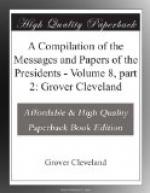of the United States had determined to sacrifice something
of that entire reciprocity which in all commercial
arrangements with foreign powers they are entitled
to demand, and to acquiesce in some inequalities disadvantageous
to ourselves rather than to forego the benefit of
a final and permanent adjustment of this interest
to the satisfaction of Great Britain herself.
The negotiation, repeatedly suspended by accidental
circumstances, was, however, by mutual agreement and
express assent, considered as pending and to be speedily
resumed. In the meantime another act of Parliament,
so doubtful and ambiguous in its import as to have
been misunderstood by the officers in the colonies
who were to carry it into execution, opens again certain
colonial ports upon new conditions and terms, with
a threat to close them against any nation which may
not accept those terms as prescribed by the British
Government. This act, passed in July, 1825, not
communicated to the Government of the United States,
not understood by the British officers of the customs
in the colonies where it was to be enforced, was nevertheless
submitted to the consideration of Congress at their
last session. With the knowledge that a negotiation
upon the subject had long been in progress and pledges
given of its resumption at an early day, it was deemed
expedient to await the result of that negotiation
rather than to subscribe implicitly to terms the import
of which was not clear and which the British authorities
themselves in this hemisphere were not prepared to
explain.
Immediately after the close of the last session of
Congress one of our most distinguished citizens was
dispatched as envoy extraordinary and minister plenipotentiary
to Great Britain, furnished with instructions which
we could not doubt would lead to a conclusion of this
long-controverted interest upon terms acceptable to
Great Britain. Upon his arrival, and before he
had delivered his letters of credence, he was met
by an order of the British council excluding from and
after the 1st of December now current the vessels
of the United States from all the colonial British
ports excepting those immediately bordering on our
territories. In answer to his expostulations upon
a measure thus unexpected he is informed that according
to the ancient maxims of policy of European nations
having colonies their trade is an exclusive possession
of the mother country; that all participation in it
by other nations is a boon or favor not forming a
subject of negotiation, but to be regulated by the
legislative acts of the power owning the colony; that
the British Government therefore declines negotiating
concerning it, and that as the United States did not
forthwith accept purely and simply the terms offered
by the act of Parliament of July, 1825, Great Britain
would not now admit the vessels of the United States
even upon the terms on which she has opened them to
the navigation of other nations.




